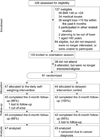Daily self-weighing and adverse psychological outcomes: a randomized controlled trial
- PMID: 24355668
- PMCID: PMC4157390
- DOI: 10.1016/j.amepre.2013.08.006
Daily self-weighing and adverse psychological outcomes: a randomized controlled trial
Abstract
Background: Despite evidence that daily self-weighing is an effective strategy for weight control, concerns remain regarding the potential for negative psychological consequences.
Purpose: The goal of the study was to examine the impact of a daily self-weighing weight-loss intervention on relevant psychological constructs.
Design: A 6-month RCT.
Setting/participants: The study sample (N=91) included overweight men and women in the Chapel Hill NC area.
Intervention: Between February and August 2011, participants were randomly assigned to a daily self-weighing intervention or delayed-intervention control group. The 6-month intervention included daily self-weighing for self-regulation of diet and exercise behaviors using an e-scale that transmitted weights to a study website. Weekly e-mailed lessons and tailored feedback on daily self-weighing adherence and weight-loss progress were provided.
Main outcome measures: Self-weighing frequency was measured throughout the study using e-scales. Weight was measured in-clinic at baseline, 3 months, and 6 months. Psychological outcomes were assessed via self-report at the same time points.
Results: In 2012, using linear mixed models and generalized estimating equation models, there were no significant differences between groups in depressive symptoms, anorectic cognitions, disinhibition, susceptibility to hunger, and binge eating. At 6 months, there was a significant group X time interaction for body dissatisfaction (p=0.007) and dietary restraint (p<0.001), with the intervention group reporting lower body dissatisfaction and greater dietary restraint compared to controls.
Conclusions: Results indicate that a weight-loss intervention that focuses on daily self-weighing does not cause adverse psychological outcomes. This suggests that daily self-weighing is an effective and safe weight-control strategy among overweight adults attempting to lose weight.
Trial registration: This study is registered at clinicaltrials.gov NCT01369004.
Copyright © 2014 American Journal of Preventive Medicine. Published by Elsevier Inc. All rights reserved.
Figures
References
-
- Flegal KM, Carroll MD, Kit BK, Ogden CL. Prevalence of obesity and trends in the distribution of body mass index among U.S. adults, 1999–2010. JAMA. 2012;307(5):491–497. - PubMed
-
- Linde JA, Jeffery RW, French SA, Pronk NP, Boyle RG. Self-weighing in weight gain prevention and weight loss trials. Annals of Behavioral Medicine. 2005;30(3):210–216. - PubMed
-
- VanWormer JJ, Martinez AM, Martinson BC, et al. Self-weighing promotes weight loss for obese adults. Am J Prev Med. 2009;36(1):70–73. - PubMed
Publication types
MeSH terms
Associated data
Grants and funding
LinkOut - more resources
Full Text Sources
Other Literature Sources
Medical


